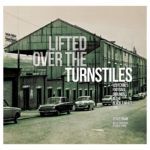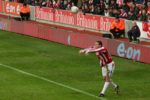If you grew up watching Football Italia on Channel Four, you probably have fond memories of many players plying their trade in Italy. Whether it was the goal scoring of Montella and Vieri, the playmaking of Totti and Nedved or the defending of Thurman and Nesta, there was something for everybody. One of the superstars in the Seria A at that time was the Uruguayan, Alvaro Recoba. Nicknamed El Chino, because of his Chinese features, he was a Uruguayan hero not only because of his footballing ability, but due to his humility off the pich. Born in Montevideo in 1976, he played football from a young age and would go down as one of the best South Americans in a generation.
He grew up playing in the academy of Danubio FC, the team that also produced Diego Forlan and Edison Cavani. At 17, he had broken into the first team and after two seasons of impressive performances would get a transfer to Club Nacional de Futbol. It was here where Recoba got first noticed by the bigger European clubs. Sandro Mazzola – the Inter legend – would spot Recoba and suggest to Massimo Moratti – the Inter president – that he had found a gem of a player. Recoba was in the midst of a stunning scoring run which saw him net 30 goals in 27 league games. In the summer of 1997, Inter spent $4.5m to bring Alvaro Recoba to the San Siro. His transfer was eclipsed as Inter went on and signed the best player on earth – Ronaldo. The two South American superstars would make their debut on the same day. It was August 31st and Inter were 1-0 down at Brescia. Dario Hubner had scored a second half goal and Inter seemed on their way to defeat. Ronaldo had started but the game changed when Recoba came on in the 72nd minute. He was squared the ball by Benoit Cauet, took a touch and rifled the ball into the top corner. To follow it up just five minutes later, Recoba would score from even further out. He would swing a free kick into the opposite corner with the ball curling away from the keeper. The fans went crazy anointing the diminutive Uruguayan as an Inter superstar that day.
But it was an anti climatic season as he went on to make only eight appearances. He was considered too small and fragile, with other teams often choosing to kick him out of the game. He would score only once more for Inter that season as they were cruelly denied the title. That goal was another stunner as he scored from just inside the opposition half. Recoba making a bigger impact could have perhaps won Inter the title. Instead just 18 months after his dream debut he was packed off on loan to Venezia. The Arancioneroverdi were in midst of a relegation battle. They had only two wins heading into January when Recoba joined them. They had 19 games left and Recoba would directly contribute to 18 goals. He scored 11 of them. He developed a seemingly telepathic partnership with Filippo Maniero and the two of them propelled Venezia to a mid table position. They finished 11th, only four points behind Inter Milan. He was and remains a hero to fans of Venezia for his contribution that season. His perhaps biggest moment came against Inter as they beat the giants 3-1 and Recoba scored a stunning free kick. His performances with Venezia impressed all the right people in Milan and he was back in the summer with Marcelo Lippi aiming to feature the buck-toothed superstar more.
Lippi would stick to that as Recoba would make 27 appearances that season. The season was another tough one for Inter though. Lippi couldn’t keep everyone in the dressing room happy and played a 3-5-2 with an emphasis on long balls that often rendered Recoba a bystander. Ronaldo would miss the majority of the season with injuries and Recoba was second for Inter in the scoring charts with 10 goals. Lippi was fired during the following season after Inter went out in the third qualifying round of the Champions League with Recoba missing a crucial penalty in the home leg. The Seria A season would start with Recoba scoring after 10 minutes, only to lose 2-1 to Reggina. In January, despite Inter struggling, Recoba was handed a new six year contract making him the highest paid player in the world. He would score eight goals as Inter flailed to fifth. The season was not plain sailing as Recoba, like many players in the Seria A, was in serious trouble over issues with his passport. He had received an Italian passport in September 1999 obtained through the director Gabriele Oriali. This meant that Recoba would count as an Italian player and help Inter get round the “three-player” rule. This was actually found to be a counterfeit passport, and he was initially given a one year ban in June 2001 but it was reduced to four months as the Italian Football Federation declared the three player rule to be illegal.
Recoba would return towards the end of 2001 with Inter top of the Seria A after a summer pay cut. They would fall away into third with Recoba only having a sporadic influence. He did once again show on his day he was virtually unplayable as he starred when Inter beat Roma beat 3-1. He also scored a phenomenal solo goal against Lecce. His goals per minute ratio was incredible. The following season was one of his best despite a few injury issues cropping up. This was also despite Hector Cuper playing him in the left midfield spot of a 4-4-2, a role he argued did not suit him. Inter took the battle for the title all the way to the end but famously lost out after being defeated by Lazio. It was October of the following season when Hector Cuper was sacked. A reason for this was Moratti fumed at the ultra-defensive former coach’s insistence that Recoba did not fit his utilitarian scheme and would not always start. Under Zaccheroni he had another season where his goals per minute ratio was incredible despite missing the start of the season to injury. Zaccheroni really let him be free and embrace his creativity. At this point in his career injuries were really taken a toll and he struggled to get consistent games. His inspirational performances could be seen with wins over Sampdoria in 2005 but just a month or two late he would break his ankle.
In 2007, Recoba was loaned off to Torino, where it was hoped he would recapture some form. As has became a common refrain, lack of playing time and injuries would hamper the Uruguayan. His best game came against Roma again, as they surprised the giants 3-1 in the Coppa Italia. Next was a move to Panionios where he became arguably the most famous player for the Greek club. It was a similar story with injuries unfortunately. He spent a season and a half with Danubio before then rejoining Nacional. He had a late career renaissance as they won the Uruguayan Championship in his first season. His best moment will no doubt be when he scored a 94th minute free kick in the Clasico against Penarol to get a win. He enjoyed four seasons with Nacional which included winning the championship in his final season. He would retire in March 2015, having not played since leaving Nacional. Perhaps the intense respect and admiration for Recoba which the Uruguayans had showed when the kick off was taken by Uruguayan President Tabare Vazquez.
Alvaro Recoba would probably have been better served being born 15 years later. He would have had more hype as a prospect, and if there was ever a player who would have suited Twitter or Vine more, then I am unsure as to who it is. His superb goals, touches and moments would have been immortalised. Frankly, it is a disappointment that the main memory of Recoba is a few moments and small bursts. His set piece ability was as good as anyone in that time. The curl he managed to put on every free kick was sensational and perhaps only Juninho or Roberto Carlos could match his ability to put them in the back of the net. It was not only from set pieces that he could strike the ball impressively. He was a superb passer, crosser and had great power in his shots. He could create opportunities with sensational runs. His close control and pace was something to behold.
Listening to football minds talk about Recoba shows how talented he was. Juan Sebastian Veron believes Recoba only didn’t become the best player in the world because he did not want to. Massimo Moratti also described him as being able to do things that normal players did not. He even expressed a preference for Recoba to Ronaldo. The inconsistent tag dogged him throughout his career. How much of that can be blamed on Recoba is definitely a question. He never found a consistent position although in hindsight the second striker role seemed to be the one where he performed best. The constant change in management along with the support of the President probably caused some issues within the team infrastructure. The injuries also piled up. He seemingly never had a sustained run in any team because he would suffer so many injuries to different parts of his body. He, by his own account, perhaps only did enough rather than pushing himself and excelling. He was often late for training with his Venezia teammates even gifting him a watch. His work rate was poor and he would often drift in games rather than take over games. People have questioned his character and ability to respond to pressure which always seemed unfair. Whatever the reasons, Recoba should have been so much more. He was a superstar and one that serves as a warning tale to others.









Recent Comments